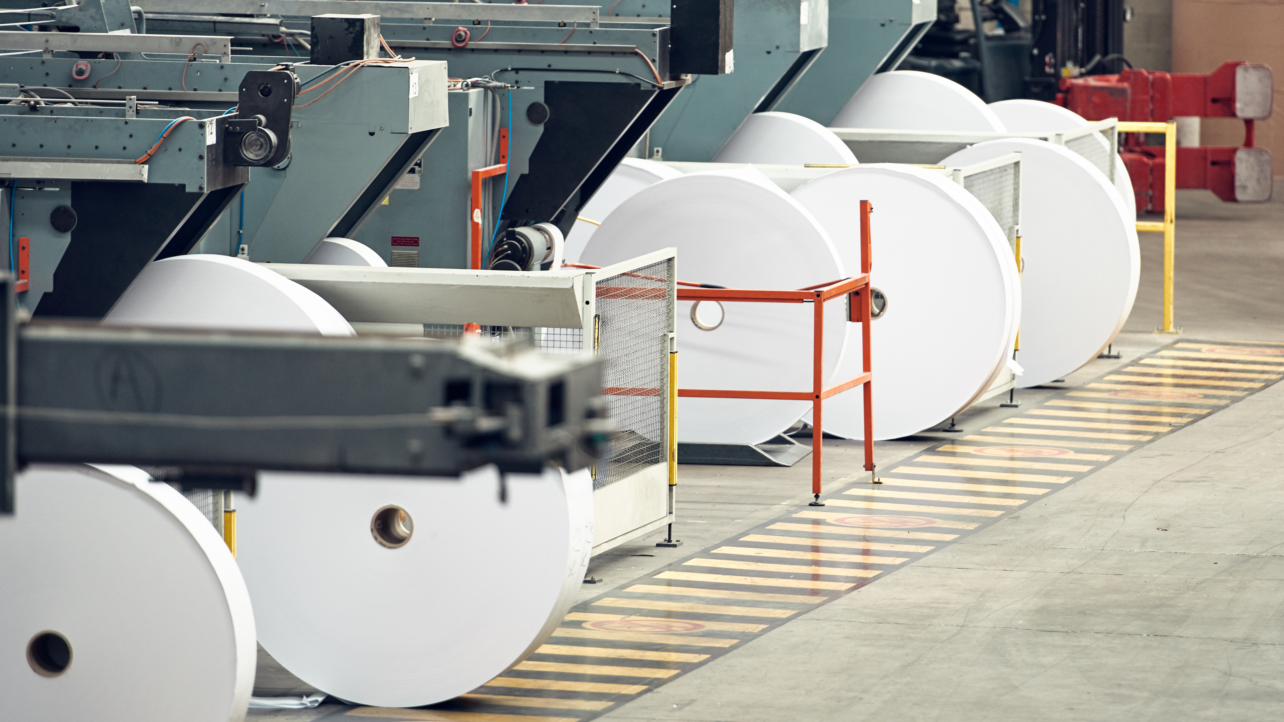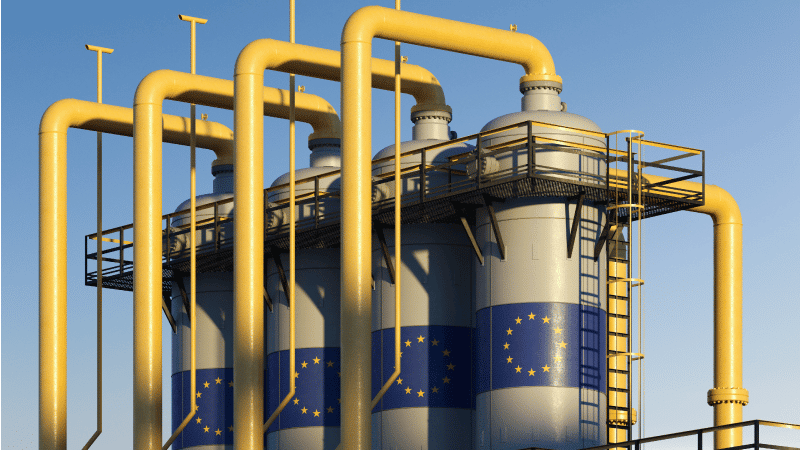Revolutionize your paper manufacturing with AI-driven optimization. Enhance efficiency, cut costs, and achieve autonomous operations like industry leaders Arjowiggins and Oji Paper. Embrace the future of smarter production!
Learn more

Today’s manufacturers account for using an estimated 33% of the world’s energy. Despite the value that manufacturing brings to local economies, many manufacturers are feeling the brunt of the current energy crisis.
This is particularly true for European manufacturers. Right now, Europe’s manufacturing sector is stuck between two difficult energy challenges. Industrial energy management solutions can help manufacturers both now and in the long term.
Let’s unpack Europe’s current energy situation and explore how IIoT can help European manufacturers endure current and future challenges.
Countries across the world are experiencing major energy shortages, including Europe. With Russia’s recent announcement to shut down the Nord Stream 1 pipeline for the indefinite future, European countries are feeling these shortages even more.
Many European countries have managed to build up their gas supply reserves ahead of the winter months. It’s possible that the majority of Europeans will get by without drastic consequences. However, the same cannot be said for Europe’s manufacturing sector.
“If there are any shortages, it’s going to be on the industrial side,” said Jack Ablin, Chief Investment Officer at Chicago-based Cresset Capital in an article by Barron’s. As such, industrials will be the first to be truly impacted by the weight of the energy shortage.
Steep prices and rising inflation are leading factors impacting manufacturers all over the world. As for energy costs, they are likely to keep rising around the world in the years to come as fossil fuel demands surpass current and projected supplies.
European manufacturers, however, are being hit particularly hard by both inflation and rising costs. With little choice but to pay these steep prices, margins are lower than ever for manufacturers. These prices have serious and long-lasting consequences for manufacturers.
Many European countries have softened the financial blow of the energy crisis for individual households. However, few (if any) measures have been taken to help manufacturing companies survive current energy constraints.
The impact of these two variables on the European manufacturing industry is substantial. In the case of some industries, like metals, the “products they make sell for less than the cost of keeping the plant running.” As we’ve seen many times before, factories that shut down temporarily rarely reopen.
These two challenges are creating new pain points for Europe’s manufacturers. As the energy crisis generates inflation and high costs, it is likely also going to cause a rise in other shortages (e.g. raw materials).
In turn, it can be difficult to meet customer demands. If your company isn’t able to operate consistently, it can result in product shortages that make customers unhappy. You may have to decide to streamline production and reduce the types or number of products you make, which can also result in upset customers.
Another pain point is an increase in wasted materials or unfinished products. Constantly having to restart production lines—whether due to energy shortages or cutting back on production quotas—can result in excessive and unnecessary waste.
Temporary shutdowns or reducing production hours can also impact your personnel. If employees feel that they can get better hours or pay elsewhere, they might leave your company during slow times and may not return when production improves. With the labor shortage already causing hiring problems across all manufacturing sectors, these personnel losses could feel particularly painful.
These additional challenges impact not only your bottom line but also your reputation. If there’s a way to keep production more or less where it needs to be during difficult times, it can mean a better chance of long-term success.
In addition to these short-term problems, there are long-standing issues that have many manufacturers considering industrial energy management tools. Climate change, political tensions, and competing energy priorities are all putting pressure on companies to manage their energy more effectively: for the planet, their bottom line, and to stay operational in these challenging times.
Regardless of the motivation, achieving better energy management is no longer optional: it’s a necessity.
One of the easiest ways for manufacturers to limit their energy consumption is by determining how to produce more while using less energy.
While most manufacturers know that they should aim to be more energy conscious, they aren’t always sure how to track, measure, and improve their energy management efforts. This is where Industrial Internet of Things (IIoT) technology can make a big difference for manufacturers.
In today’s volatile energy climate, manufacturers are hunting for both immediate and long-term solutions to better manage their energy usage. IIoT tools stand out as the ideal answer for multiple reasons:
Quick to launch and use: IIoT solutions can be implemented within days or weeks. Your data already exists, making you one step away from uncovering optimizations. It takes significantly longer to modernize, update, or replace equipment.
Low-cost investment: Especially when compared to buying new equipment, IIoT is a cost-effective route for manufacturers of all sizes.
High ROI: IIoT generates a high ROI given its low cost and relatively rapid implementation timeline. Many of our customers say that Braincube pays for itself many times over.
Based on facts, not models: IIoT tools (like Braincube’s ready-to-use applications) pair historical data with AI and big data analytics. The uncovered opportunities are unique to your processes, meaning there is no risk because you know the results are definitive.
The reality is that only IIoT tools can provide manufacturers with the kind of powerful data analysis tools they need to uncover energy-saving process optimizations. Modernizing or replacing equipment takes a lot of time and is expensive.

Updating machine settings is one way to improve energy efficiency. However, without the right data, teams can’t possibly understand how to adapt settings for specific production conditions. The weather, raw material sources, final end product: all these conditions (and more) make a difference in what machine settings to use.
Only by analyzing historical data can teams understand what to do in each given production scenario to save energy, reduce waste, or other objectives. IIoT technologies and tools are the easiest and fastest ways to get these answers. The differentiator of these tools is that they take out the guesswork for employees, enabling them to take action quickly.
As Europe’s energy crisis continues, additional pressure will be forced on manufacturers to manage their energy usage in order to remain competitive (and, in extreme cases, remain operational). Companies may need to look beyond energy management to other improvement efforts, such as process or production management.
Digital tools like IIoT can offer manufacturers improvements in how they collect, manage, and understand data. In fact, digital solutions will be the fastest and most cost-effective way to battle today’s current energy situation and prepare for future challenges.

Digital Twins can make a big difference in helping your manufacturing company turn data into your competitive advantage during volatile times. But what exactly are manufacturing Digital Twins and how are they used?

In today’s volatile energy climate, manufacturers need both immediate and long-term solutions for industrial energy management.
A robust IIoT Platform will provide manufacturers with opportunities to kick-off or accelerate their energy management initiatives.

While most manufacturers know that they should aim to be more sustainable, they are looking for more information on how to track and measure their efforts.
This white paper covers four digital tools that can be used to implement sustainable practices.